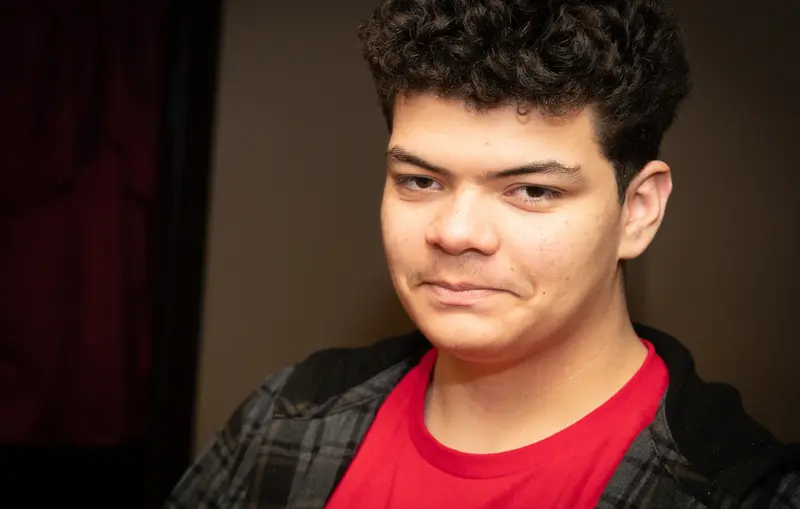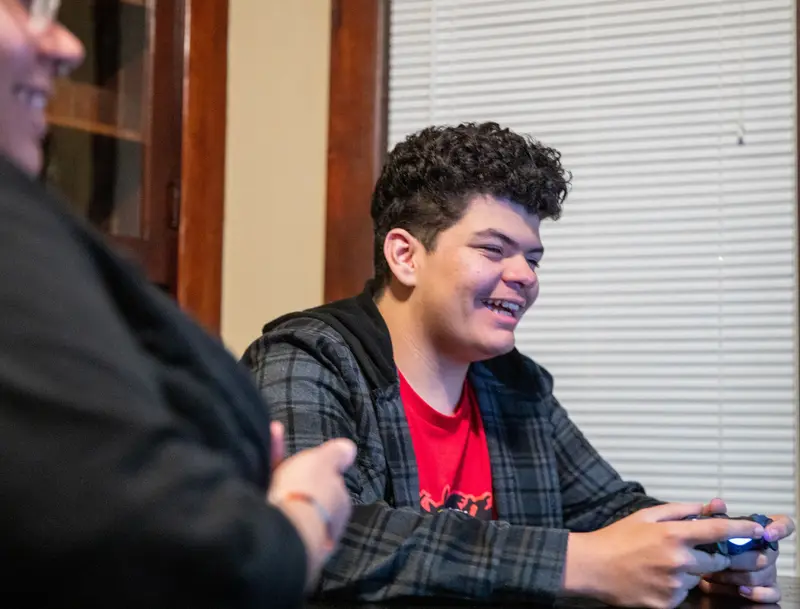This article was produced for ProPublica’s Local Reporting Network in partnership with The Seattle Times. Sign up for Dispatches to get stories like this one as soon as they are published.
In September, Megan Cummings sat down at a conference table across from four Tacoma, Washington, school officials who could determine the course of her son’s education.
ElijahKing, 14, had run away from his middle school earlier that week during an argument with a classmate. Cummings believed the group, which managed her son’s special education plan, wanted to discuss how to better support him. ElijahKing swiveled nervously in a chair beside her.
Instead, the Tacoma Public Schools educators told Cummings that ElijahKing couldn’t come back. He would be sent to a school for children with complex disabilities, one of a network of private special education programs that serve about 500 public school students.
ElijahKing turned away from the group, his eyes welling up.
Cummings had read online reviews accusing the school’s staff of mistreating kids. She pleaded with the district officials to give ElijahKing a second chance, but it was too late. He had already been enrolled in the new school.
Like other parents, Cummings was confronting a flaw in Washington’s special education system: It has failed to monitor the private schools that serve some of the state’s most vulnerable kids, leading to a wide range in the quality of the programs. Some are highly sought-after schools offering intensive therapy and instruction tailored to specific disabilities. Others, as The Seattle Times and ProPublica recently documented, have faced years of complaints about understaffing, lack of curriculum and a reliance on restraint and isolation to control student behavior.
The disparity among schools forces parents to take extraordinary measures to find a way around the system’s flaws. Some of them hire lawyers to help shepherd their kids toward the best schools — or keep them out of the worst.
“A lot of the advocacy comes down to resources and who has power and can get an attorney,” said Carrie Basas, the former director of the Washington State Governor’s Office of the Education Ombuds. “You have families that understand there are places they can lobby hard for, instead of having their kids sent somewhere else.”
Cummings — a single mother of two children with disabilities who had recently been homeless — didn’t have power or resources. But she did have one thing in common with many of the parents who take on the system: an unyielding determination to defend her child’s education.
Underfunded and Inequitable
Programs like the one ElijahKing was enrolled in, known as “nonpublic agencies,” are meant to offer more intensive services that districts say they can’t provide in public schools.
School districts often work with families to find the right educational setting. Some parents seek out — and push districts to pay for — highly regarded nonpublic agencies that can cater to their students’ disabilities. Others, like Cummings, want their kids integrated in their neighborhood schools with additional support, but districts steer their kids to poorly performing nonpublic agencies instead.
To some extent, this push and pull exists in every state. The federal Individuals with Disabilities Education Act allows families to settle disputes about their child’s special education through a due process hearing, where a school district can be ordered to provide certain education services or to place the child in a specialized school.
But Washington’s weak oversight, and its increased reliance on separate schools for students with disabilities, makes educational inequities particularly acute here. That system exposes disadvantaged kids to programs with the worst reputations. Though the state and school districts spent at least $173 million on the programs over the five school years ending in 2021, the state has few academic standards and no centralized system for tracking key measures like how often the schools restrain students.
ElijahKing was being sent to one of the schools with the worst reputations, the Northwest School of Innovative Learning. School districts have complained to the state for years about problems there, including classrooms being led by unqualified aides instead of certified special education teachers, a recent Seattle Times and ProPublica investigation found. The school has also faced allegations of abuse, including an incident, caught on surveillance video, in which a teacher put a 13-year-old boy in a chokehold.
And former staffers reported feeling pressured by the school’s owner, Fairfax Hospital, and its parent company, Universal Health Services, to skimp on staffing and resources while enrolling more students than staff could handle.
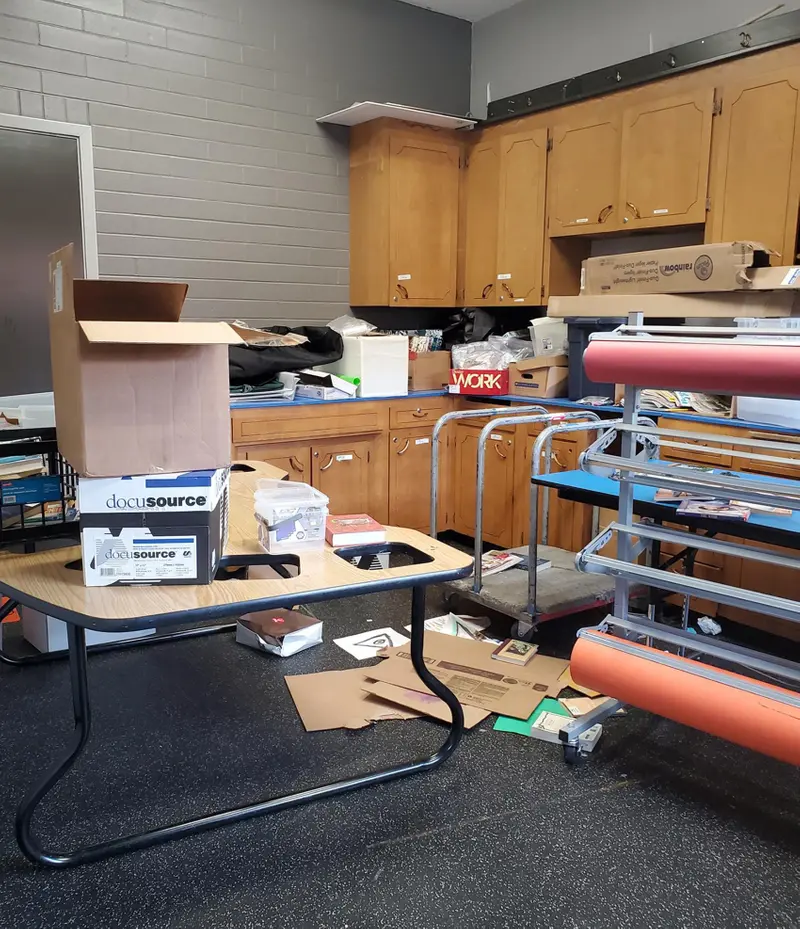
The company previously defended the program in a statement to the Times and ProPublica, saying administrators take seriously the responsibility of addressing students’ complex needs. It denied that Northwest SOIL understaffed campuses and declined to comment on specific allegations of abuse, but said “restraints and seclusion are always used as a last response when a student is at imminent risk of hurting themselves or others.”
Though the state releases only limited demographic data to protect student privacy, the figures that are available — for larger schools — point to disparities in which children get access to better schools. Among the larger schools, Northwest SOIL stands out, with one of the highest proportions of low-income students. It also has above-average shares of homeless students and Black students, an analysis of 2020-21 school year data shows.
Fairfax, the largest private psychiatric hospital in Washington, attributed Northwest SOIL’s student composition in part to the demographics of nearby districts that send the most students to the school, including Tacoma and Olympia, which have lower median household incomes than other parts of Western Washington. But Northwest SOIL also has a campus in Redmond, one of the state’s wealthiest cities.
The company’s response, however, doesn’t fully explain the demographic differences because districts can send their students to any nonpublic agencies that cater to the child’s disabilities and have space for them.
Tania May, head of special education services at the state Office of Superintendent of Public Instruction, acknowledged inequities in the system and said the agency wants to increase funding to create more public programs and decrease the reliance on nonpublic agencies.
Washington’s special education system is underfunded overall — a shortfall of nearly $500 million a year, according to state education officials. Following the Times and ProPublica’s reporting, state education officials are considering sweeping reforms to state laws that would give districts more resources to serve students with disabilities.
ElijahKing’s mother felt like she had no control over her son’s academic circumstances, and she didn’t know how to demand better schools, get more resources or take legal action to steer her son toward respected programs.
But some parents did.
“An Attorney Walks in, Everyone Is Shaken”
As the system’s problems overwhelmed Cummings, Mike Hipple and Sam Read were also struggling to get their daughter, Hillary, who has autism, the services she needed in Seattle schools. By sixth grade, she would come home with a backpack full of incomplete worksheets, signaling to Hipple and Read that she wasn’t getting help at school.
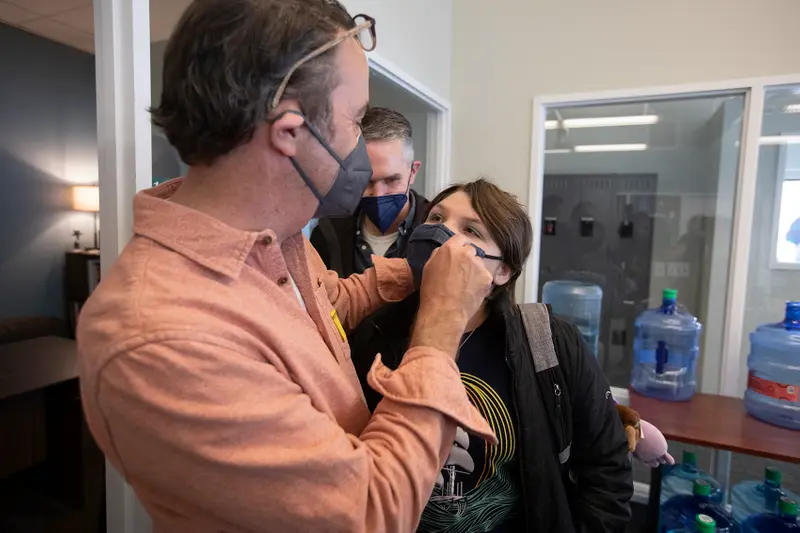
The college-educated, middle-class couple had joined several Facebook groups for parents of children with disabilities and met monthly with others to discuss parenting strategies — support that can be elusive for parents like Cummings, who doesn’t own a car and has at times lacked internet access.
In late 2019, a parent in one of Hipple and Read’s support groups suggested they hire an attorney.
It often costs more than $50,000 and takes months of wrangling to bring a case to the hearing stage, special education attorneys say, although parents can recoup attorney fees if they win.
“We were terrified to get a lawyer because we aren’t super wealthy people,” said Hipple, a freelance music photographer and editor. They knew they didn’t have money for a lengthy legal battle, but they did have the time to learn about the system and push back against the district.
It took just one demand letter from their lawyer, which cost about $4,200, to get the district to pay for Hillary’s transfer to the Academy for Precision Learning, a nonprofit with two campuses and 97 students in Seattle’s University District.
Tuition, plus the cost of a one-on-one aide and a board-certified behavioral analyst, often exceeds $100,000, which the couple hoped the district would pay for. Seattle schools countered by proposing other programs, but Hipple and Read said that one was too small and that the other catered to children with disabilities that seemed more severe than Hillary’s.
“We’re privileged. We have the time, space and luxury to get it done,” Hipple said. “The parents who are working three jobs don’t have that.”
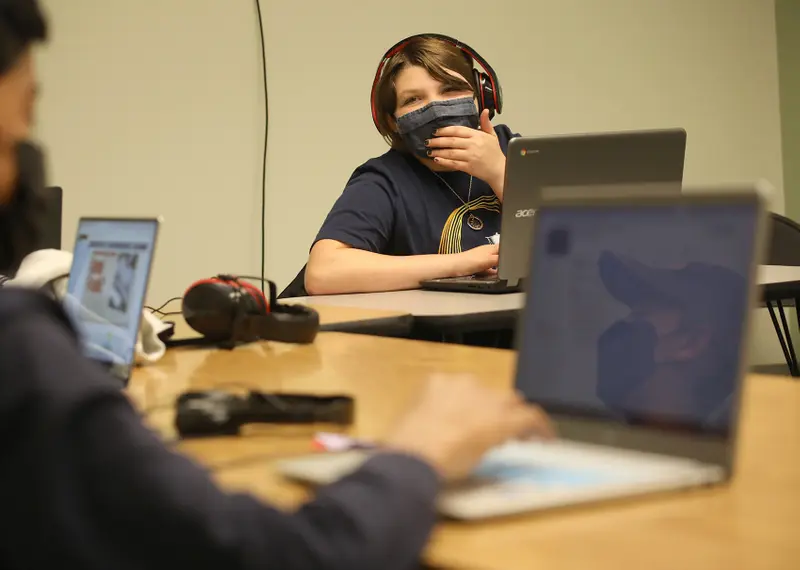
Seattle Public Schools declined to comment on the students’ individual experiences, citing federal student privacy laws. District officials said they would not respond to questions about students, even if parents signed release forms.
Hiring an attorney doesn’t automatically get a student into their parents’ preferred school, but the legal pressure gives parents more power in special education decisions.
“An attorney walks in, everyone is shaken,” said Chris Willis, special education director at the Orting School District, calling the dynamic one of the “foundational failures” in special education. In his nearly three decades of special education experience, Willis found that most parents don’t seek advocates — who can offer free advice — or attorneys. “Some don’t really engage or perhaps know about their legal rights,” he said.
Lawyers, for instance, can steer districts toward acclaimed out-of-state private schools that cost hundreds of thousands of dollars. In the 2020-21 school year, at least 15 students in Washington got placements that cost more than $300,000.
Theresa DeMonte’s son has severe autism and an intellectual disability but didn’t appear to be making any progress in Seattle schools. So DeMonte, a lawyer at a downtown Seattle firm, hired a special education attorney and in 2017 requested a hearing before a judge.
Her son needed round-the-clock support, but Washington has no residential schools that qualify for state special education funding. DeMonte researched top autism programs around the country and suggested the New England Center for Children in Massachusetts, a school staffed by board-certified behavior analysts that offers therapeutic activities and an indoor pool.
The district ultimately agreed to cover her son’s tuition, plus travel costs for multiple visits each year. Seattle spent as much as $412,000 a year on the school, records show.
“He was placed there because I’m a good advocate and I hired a very good attorney,” said DeMonte. “There’s no doubt in my mind that a lot of children’s needs aren’t being met because they don’t have access to the same resources.”
“He Just Needed the Chance”
For a long time, ElijahKing was one of those children.
In 2017, Cummings was living in a homeless shelter and her minimum-wage retail job was in peril because of the time she had to spend attending to ElijahKing’s educational needs. He wasn’t making progress in school, and when he had outbursts, educators routinely called the police, who took him to a local hospital.
Cummings couldn’t afford mental health care for ElijahKing, but she’d heard that the state would pay for in-patient treatment if he was in the foster system. So, she made a painful choice: Cummings let the hospital call Child Protective Services, which eventually placed him at Ryther, a state-supported mental health facility. “It was the hardest decision,” she said.
After returning to her care in 2019, ElijahKing spent nearly two years in a public school for children with behavioral disabilities in Seattle. But when the program shut down at the end of the 2021-22 school year, Seattle Public Schools suggested placing him at Northwest SOIL.
By then, Cummings had moved to Tacoma, where she had found stable housing. ElijahKing transferred to nearby Hilltop Heritage Middle School, the first “normal” school he’d attended in years, as he described it to reporters.
Then he got into the argument at Hilltop while he’d been briefly left without a one-on-one aide. As the situation escalated, ElijahKing reacted by running from school, darting across a busy street.
That’s when Tacoma Public Schools enrolled him in Northwest SOIL. Feeling she had no other option, Cummings kept him home.
In the weeks that followed, Tacoma recommended four other private programs, but none felt appropriate for her son. Some were an hour’s drive from her home, and though the district would handle transportation, Cummings didn’t want ElijahKing so far away. She wanted him in his neighborhood school with more support.
Tacoma Public Schools also declined to comment on students’ experiences, even with a privacy waiver. “Our goal is to always find the least restrictive learning environment for students,” the district said in a statement. “This looks different for every student and requires some flexibility.”
Without the support groups that others, like Hipple and Read, had turned to, Cummings went to the local library to look up laws on special education. She called the governor’s education office and asked a local nonprofit for help. Neither effort panned out. Eventually she found an article describing a student being restrained and isolated at another school, along with the name of a local attorney, who connected Cummings with Cedar Law, a Seattle-based firm that specializes in educational disputes. Lara Hruska, a managing partner at Cedar Law, agreed to take the case pro bono.
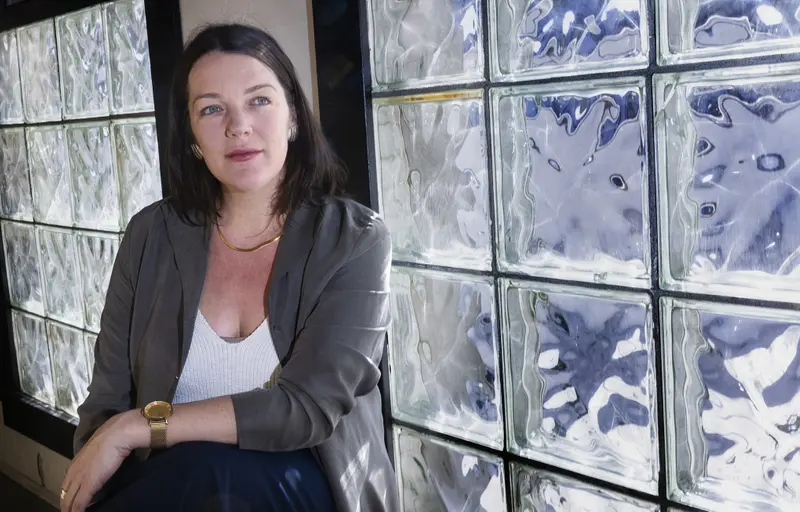
“She was stuck and needed a lawyer to unstick the situation,” Hruska said. Cedar filed an expedited request for a hearing. After weeks of legal proceedings, Tacoma agreed to bring ElijahKing back to Hilltop Heritage.
Cummings managed to buck a system that has sent hundreds of students to Northwest SOIL in the past few years, Hruska said: “She was extraordinary in her ability to disrupt that pipeline.”
Though the dispute kept him out of school for two months, ElijahKing reenrolled in November. A bashful teen with more to say about video games than school, ElijahKing simply said his return to Hilltop Heritage was “really good.” He made friends, he said, and looks forward to school most days.
Within a week, his teachers discussed transitioning him from a special education classroom to a few general education courses, where he’d study alongside nondisabled classmates, Cummings said. In January, he won an award recognizing him as one of the school’s most responsible and respectful students. Cummings described ElijahKing’s potential — he could catch up to his peers, graduate, maybe go to college.
“He’s so bright, I’m telling you,” she said, the same appeal she’d made to district officials just months earlier. “He just needed the chance.”
